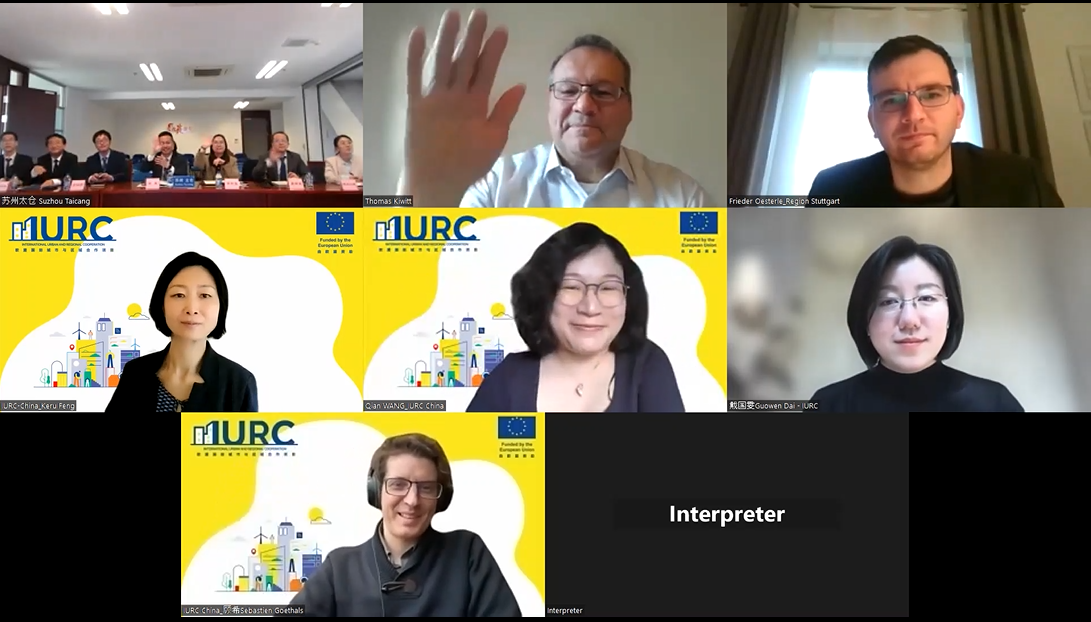On April 17th, 2023, the pilot cities of the IURC China – Stuttgart Urban Region and Taicang (Suzhou) – held a working session to discuss potential cooperation on Transit-Oriented Development (TOD) and productive city development, energy efficiency measures, and important cultural and business activities. The meeting was moderated by Ms. Wang Qian, the Team Leader of IURC China.
Presentations
Mr. Thomas Kiwitt, Technical Director for the Verband Region Stuttgart, introduced the ecological, economic, and social context of the Stuttgart Urban Region. The Stuttgart Urban Region is a dynamic economic hub, home to both global players and SMEs across sectors such as automobile, high-tech, and crafts. The region is renowned for its innovation, tradition, lifestyle, and sustainability, with a strong commitment to balancing ecological, social, and economic issues. Its development priorities:
- GREEN METRO – urban sustainability
- CLIMATE FRIENDLY METRO – renewable energy Infrastructure
- JUST METRO – equitable development
- PRODUCTIVE METRO – green industrial transition
- TOD – integrated rail-based urban development
The region’s flagship project, Stuttgart 21, aims to connect the region to high-speed trains and transform current rail yards into public spaces, offices, and residential areas. The region faces multiple challenges, including balancing the need for land for industrial and residential use, modern mobility infrastructure, renewable energy sites, soil protection, climate change adaptation, recreation, and biodiversity. Effective decision-making and implementation are critical to achieving sustainable development goals.

Mr. ZHANG Zhan, the Deputy Mayor of Taicang, unveiled the city’s ambitious development plans aimed at creating a vibrant and livable city with a global outlook. Taicang enjoys a strategic location closely linked to the metropolitan city of Shanghai, making it a hub for logistical, human, and financial activities. With a top-tier port ranking as the 25th largest worldwide, Taicang is renowned for its inclusive and receptive nature. Its unique partnership with Germany symbolizes its aim for global collaborations.

Mr. Duan Yueqiang, Director of Sino-German Cooperation Office in Taicang High-tech Zone, presented the Taicang Day, an event that has been promoting economic and cultural exchange between Taicang and Germany annually since 2008. The event coincides with an economic forum on innovation and cooperation between Germany and Taicang (Suzhou) and covers trade, investment, technology, education, and culture. The event serves to showcase Taicang’s accomplishments in attracting German enterprises, developing high-tech industries, and constructing a livable city. Taicang Day includes cultural activities and knowledge exchange programs and has taken place in multiple German cities. In 2023, the event will be held in Stuttgart.

Mr. Fan Weimin, Deputy Director of Taicang High-tech Zone Planning and Construction Bureau, unveiled the Transit-Oriented Development (TOD) plan for Loujiang New District. The plan features three key stations along the rail transit network: Taicang Station, Shiba Port Road Station, and Baiyundu Avenue Station. The station areas’ planning structure, functional layout, and design aim to create a new regional urban gateway, industrial logistic hub, and central city areas, with a focus on ecological and cultural perspectives, as well as incentives for Sino-German cooperation.

Discussions
Mr. Thomas Kiwitt expressed gratitude for the invitation to Taicang Day and is willing to provide support in finding a venue and other necessary arrangements for the Taicang Day event. He also emphasized that TOD in Stuttgart aims to transform the area around the main railway station into a mixed-use urban district with high-quality public spaces, green infrastructure, and sustainable mobility. The goal is to revitalize and reconnect the existing city centre. While the Loujiang New City TOD project is part of a larger development plan to create a regional urban gateway, an industrial hub, and a new city centre. Taicang´s TOD scheme is on a different scale from Stuttgart 21. Stuttgart Urban Region is open to exchange different challenges, solutions and cooperation on the TOD project and learn from each other to reach a goal of an attractive, productive and low-carbon city, which is aligned with the Leipzig Charter and The Urban Agenda for the EU.
Ms. DAI Guowen, Cluster manager of IURC China, encouraged delegates of Taicang city to select a pilot area for collaboration with Stuttgart urban region and utilize the Low Carbon City concept in urban planning to develop the TOD Model.
Mr. Sebastien Goethals, Cluster manager of IURC China, discussed the potential for collaboration between the two cities in terms of mobility and logistics, with a focus on integrating smart-technology and e-mobility into urban planning to reduce the carbon footprint. Participants highlighted the potential for synergy between local industries, urban planning, and city government policies, and suggested that the two cities could act as laboratories for innovation.
Keru from IURC team discussed potential cooperation approaches, including knowledge exchange, pilot projects, and capacity building in Transit-Oriented Development (TOD) and low-carbon urban district development.
Deputy Mayor Zhang emphasized the expertise of German companies in resource efficiency and renewable energy. He extended a cordial invitation to the Stuttgart delegation to visit Taicang and suggested exploring potential cooperation in circular agriculture practices as well.
Ms. YU Ting, Deputy Director of Taicang Development and Reform Commission, proposed identifying a pilot zone for joint development of a low-carbon Transit-Oriented Development (TOD) area.

During the closing remarks, Ms. WANG Qian highlighted the history of participation in IURC by Taicang (Suzhou) and the Stuttgart urban region, and cooperation in various fields, including industry, innovation, and culture. Both sides agreed to make use of the upcoming Taicang Day to exchange ideas and suggestions on how to move forward with concrete cooperation and establish next milestones.
